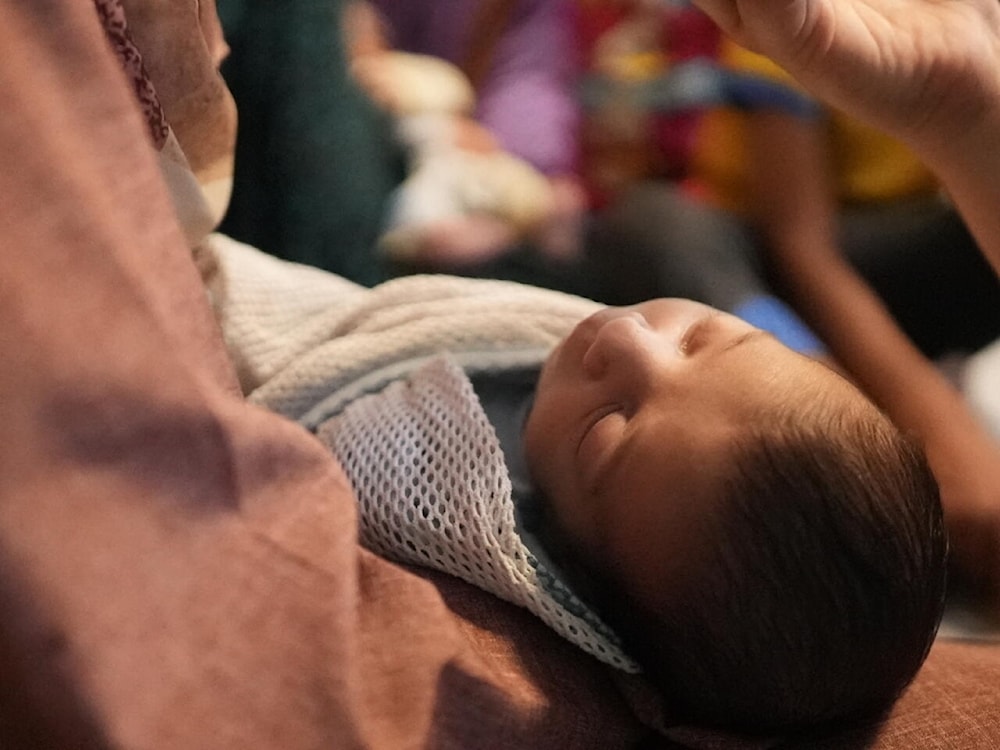Famine in Gaza causing women to give birth to stillborn babies
ActionAid has warned that numerous operations have been performed on pregnant women in which their fetuses have died from malnutrition.
-

A newborn at Al-Shifa Hospital in Gaza, October 26, 2023 (UNFPA)
Mothers in the Gaza Strip are giving birth to stillborn babies as a result of the increased starvation and the breakdown of humanitarian operations, ActionAid International reported.
With one-quarter of Gaza's population on the verge of famine and more than a dozen children dying of malnutrition in the north, ActionAid warns that an already overburdened humanitarian system will collapse as a result of the looming Rafah offensive.
The organization reported that distributions across Gaza have been attacked "further endangering aid operations" and killing more Palestinians.
The statement added that growing attacks on paramedics have forced the Palestinian Red Crescent Society to suspend medical missions across the Strip, and UNRWA is facing severe budget slashes as donors withdraw their support of the aid agency.
In addition, numerous children have died from malnutrition, and "there are many operations that have been performed, like cesarean sections to remove fetuses, [which] died due to malnutrition among women."
The statement added that over 95% of women who reach the hospital and are evaluated are found to be suffering from anemia.
As Western nations boost assistance drops into Gaza, Amjad al-Shawa of the Palestinian NGOs Network in Gaza told ActionAid that it will not be enough to address the needs of the people of Gaza consistently.
Israeli authorities turned away a 14-truck supply convoy in northern Gaza on Wednesday, the World Food Programme's first attempted delivery in two weeks.
“The airdrop [of humanitarian aid] is not enough at all in such conditions; there is a need for land transportation of aid. “Every day we’re in [dire] need of 4,000 truckloads in order to cover the basic needs of these people."
The Palestinian Central Bureau of Statistics reported that "Israel" killed 9,000 Palestinian women since the beginning of the Israeli genocidal war on the Palestinian people of the Gaza Strip.
Pregnant women in Gaza grapple with malnutrition and dehydration amid severe food shortages. Many of their newborns are underweight and face health issues. Mothers who breastfeed encounter reduced milk production due to malnutrition, creating financial challenges in affording and purchasing formula. Consequently, mothers resort to inadequate or even unsafe alternatives for breastfeeding.
Women's health in Gaza has been adversely affected by Israeli aggression, leading to a scarcity of sanitary supplies and reliance on primitive options. Some women resort to contraceptive pills to maintain sexual and reproductive health. The lack of medication and the unavailability of numerous feminine hygiene products contribute to female infections, negatively impacting both mental and physical well-being.
Maternity in crisis: 1 in 5 pregnant women in Gaza faces malnutrition
Doctors in Gaza issued a warning on February 29 that one out of every five pregnant women attending a prominent clinic in central Gaza is suffering from malnutrition. This revelation comes amid severe shortages of fuel and medical supplies due to the Israeli genocide and total blockade, causing the last functioning hospital in the northern part of the strip to shut down.
“Every day, we see women and children coming into our clinic suffering from acute malnutrition,” said Dr. Maram, the lead physician for Project Hope.
Every ten minutes, a pregnant woman in the #Gaza Strip gives birth under brutal circumstances, as thousands of other pregnant women in shelter centers and tents face the risk of contracting diseases, abortion, and even direct murder by Israeli forces.#PalestineGenocide pic.twitter.com/VO08sNUJ3S
— Al Mayadeen English (@MayadeenEnglish) February 14, 2024
In the three weeks leading up to February 24, a Deir al-Balah clinic in Gaza reported that 21% of pregnant women receiving treatment were identified as malnourished. Additionally, one in ten children examined at the clinic during the same period were found to be suffering from malnutrition, according to the nonprofit organization.
“As infectious diseases spread in cramped areas and food becomes even scarcer, we will see more and more people going hungry – including the health workers who are trying to help. I worry every day that I won’t find anything to eat,” Dr. Maram said.
Despite warnings from the UN about "pockets of famine" and widespread hunger in Gaza, the flow of aid to the Strip remains minimal. Shipments have decreased by approximately half compared to January levels, averaging fewer than 100 trucks per day or 2,300 for the entire month. This falls significantly short of the estimated requirement of 500 trucks daily to meet the basic needs of the population.

 4 Min Read
4 Min Read








